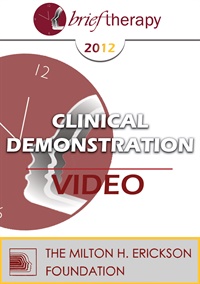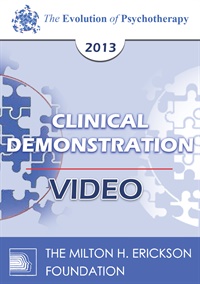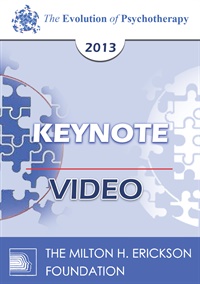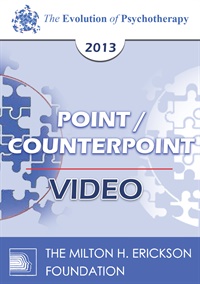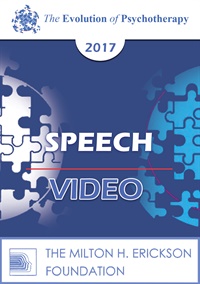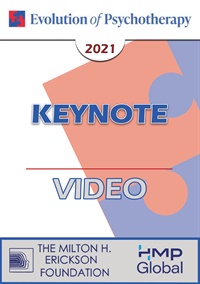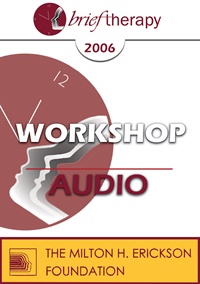
- Average Rating:
- Not yet rated
- Topic Areas:
- Workshops | Neuroscience | Psychotherapy | Brief Therapy | Transference / Countertransference | Consciousness
- Categories:
- Brief Therapy Conference | Brief Therapy Conference 2006
- Faculty:
- Ernest Rossi, PhD
- Duration:
- 2:31:00
- Format:
- Audio Only
- Original Program Date:
- Dec 09, 2006
- Short Description:
- Recent neuroscience research suggests that empathy, rapport and transference may be mediated by our mirror neurons. this new view of the basic talent of all psychotherapists will be explored during group processes and individual demonstrations utilizing Rossi's innovative approaches to therapeutic hypnosis and psychotherapy.
- Price:
- $15.00 - Base Price
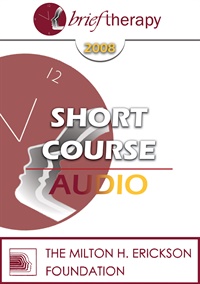
- Average Rating:
- Not yet rated
- Topic Areas:
- Short Courses | Brief Therapy | Consciousness | Resources | Therapist Development | Unconscious Processes
- Categories:
- Brief Therapy Conference | Brief Therapy Conference 2008
- Faculty:
- James Rini | Melissa Rini, MS
- Duration:
- 1:24:29
- Format:
- Audio Only
- Original Program Date:
- Dec 11, 2008
- Short Description:
- Fuzzy Focus is a method that therapists can use to bring about quick and effective results. Fuzzy Focus is a process whereby unconscious resources are accessed by disrupting existing mind-sets, which are keeping alternative frames of reference unavailable. To use Fuzzy Focus effectively, therapists must be grounded with a coherent understanding of human nature and human consciousness. This workshop teaches the participant Fuzzy Focus as well as the theoretical framework needed to use Fuzzy Focus.
- Price:
- $15.00 - Base Price
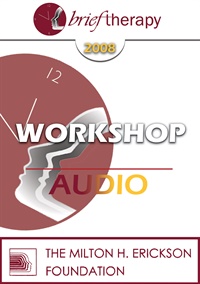
- Average Rating:
- Not yet rated
- Topic Areas:
- Workshops | Multicultural | Storytelling | Brief Therapy | Consciousness
- Categories:
- Brief Therapy Conference | Brief Therapy Conference 2008
- Faculty:
- Jean Houston, PhD
- Duration:
- 2:55:30
- Format:
- Audio Only
- Original Program Date:
- Dec 14, 2008
- Short Description:
- This workshop will explore archetypical and imaginal sources for Social Artistry, and address states of consciousness research as it applies to exploring the possible human and the possible society.
- Price:
- $15.00 - Base Price
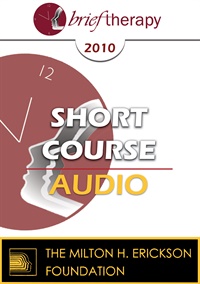
- Average Rating:
- Not yet rated
- Topic Areas:
- Short Courses | Brief Therapy | Unconscious Processes | Consciousness
- Categories:
- Brief Therapy Conference | Brief Therapy Conference 2010
- Faculty:
- James Rini | Melissa Rini, MS
- Duration:
- 1:30:13
- Format:
- Audio Only
- Original Program Date:
- Dec 09, 2010
- Short Description:
- Milton Erickson said, “Change first then insight.” Too often therapists try to produce change by giving clients insight into their problems expecting to produce results. This approach reduces effectiveness as it overestimates the power of the conscious mind while neglecting and underestimating the unconscious mind’s role in the healing process.
- Price:
- $15.00 - Base Price
- Average Rating:
- Not yet rated
- Topic Areas:
- Clinical Demonstrations | Consciousness
- Categories:
- Brief Therapy Conference | Brief Therapy Conference 2012
- Faculty:
- Ernest Rossi, PhD
- Course Levels:
- Master Degree or Higher in Health-Related Field
- Duration:
- 1:00:54
- Format:
- Audio and Video
- Original Program Date:
- Dec 07, 2012
- Short Description:
- BT12 Clinical Demonstration 05 - Creating Consciousness with Activity-Dependent Gene Expression and Brain Plasticity - Ernest Rossi, PhD The new Neuroscience of utilizing Implicit Processing Heuristics in facilitating the 4-stage creative process in the construction and creative reconstruction of fear, stress and post traumatic memories and symptoms during brief psychotherapy will be demonstrated with the entire audience, as well as a volunteer.
- Price:
-
Sale is $29.00
price reduced from Base Price - $59.00
Tags: Consciousness
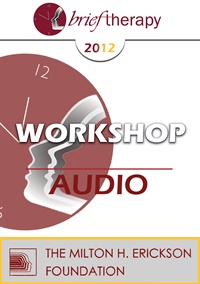
- Average Rating:
- Not yet rated
- Topic Areas:
- Consciousness | Neuroscience | Psychotherapy | Workshops | Four-Stage Creative Process | Self-Care | Therapist Development
- Categories:
- Brief Therapy Conference | Brief Therapy Conference 2012
- Faculty:
- Ernest Rossi, PhD
- Duration:
- 2:43:56
- Format:
- Audio Only
- Original Program Date:
- Dec 08, 2012
- Short Description:
- Neuroscience documents how experiences of (1) Novelty, (2) Environmental Enrichment, and (3) Mental & Physical Exercise can optimize gene expression, brain plasticity (brain growth), and mind-body healing. We will practice psychotherapy as discussed in my recent book Creating Consciousness: How Therapists can Facilitate Wonder, Wisdom, Beauty, and Truth.
- Price:
- $15.00 - Base Price
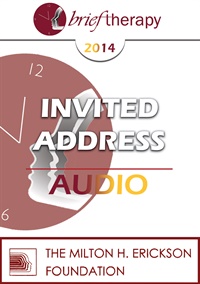
- Average Rating:
- Not yet rated
- Topic Areas:
- Consciousness | Invited Addresses | Neuroscience
- Categories:
- Brief Therapy Conference | Brief Therapy Conference 2014
- Faculty:
- Ernest Rossi, PhD
- Duration:
- 56:51
- Format:
- Audio Only
- Original Program Date:
- Dec 14, 2014
- Short Description:
- Current research in psychosocial genomics is reviewed to underpin a new evolutionary RNA/DNA epigenomic theory of the quantum transformations of consciousness and creative cognition. The alternating classical-to-quantum and quantum-to-classical transitions on all levels from mind to gene are explored for developing an understanding of how the 4-stage creative process operates in an evolving cosmos/consciousness field theory.
- Price:
- $15.00 - Base Price
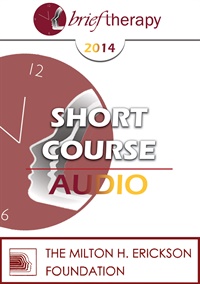
- Average Rating:
- Not yet rated
- Topic Areas:
- Consciousness | Trauma | Sex and Sexuality | Short Courses | Meditation, Spirituality and Yoga | Family Constellations | Experiential Therapy
- Categories:
- Brief Therapy Conference | Brief Therapy Conference 2014
- Faculty:
- Emily Volden, MSW, LICSW | Dan Booth Cohen, PhD
- Duration:
- 1:26:22
- Format:
- Audio Only
- Original Program Date:
- Dec 11, 2014
- Short Description:
- Family Constellations can be used in therapy as a process for treating sexual trauma. The experiential process accesses the heart as an organ of perception to explore, heal, and release sexual trauma while reclaiming clients’ empowered sexual selves. Employing a light meditation, therapist and client open the doors of awareness to ancestral and archetypal consciousness.
- Price:
- $15.00 - Base Price
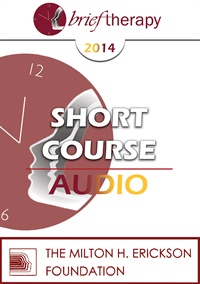
- Average Rating:
- Not yet rated
- Topic Areas:
- Anxiety | Depression | Trauma | Short Courses | Brief Therapy | Ericksonian Hypnosis and Therapy Techniques | Consciousness
- Categories:
- Brief Therapy Conference | Brief Therapy Conference 2014
- Faculty:
- Joseph Dowling, MS, LPC
- Duration:
- 1:27:36
- Format:
- Audio Only
- Original Program Date:
- Dec 11, 2014
- Short Description:
- Milton H. Erickson, M.D. understood that the conscious (thinking) mind is where symptoms are frequently created and cultivated while the subconscious mind is a limitless storehouse of healing energies, potentials, and solutions. This short course will describe a deceptively simple, Ericksonian approach to becoming powerfully calm. Live demonstrations, experiential zone exercises, and case studies will be facilitated to teach how solution-focused questions, strategic interventions, and formal/conversational hypnotherapy effectively treat anxiety, depression, and trauma.
- Price:
- $15.00 - Base Price
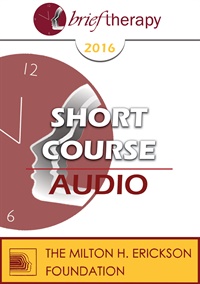
BT16 Short Course 32 - From East to West: Utilizing Consciousness and Strengths - John Lentz, D. MIN
- Average Rating:
- Not yet rated
- Topic Areas:
- Consciousness | Short Courses | Multicultural | Utilization
- Categories:
- Brief Therapy Conference | Brief Therapy Conference 2016
- Faculty:
- John Lentz, D. Min.
- Duration:
- 1:12:38
- Format:
- Audio Only
- Original Program Date:
- Dec 08, 2016
- Short Description:
- Working in collaboration with our clients to create solutions is one of the new directions that effectiveness based approaches advocate. The workshop leaders who live in Iran and United States respectively will be demonstrating these techniques. By utilizing culturally oriented assets, attendees will be offered a unique approach that can help empower people.
- Price:
- $15.00 - Base Price
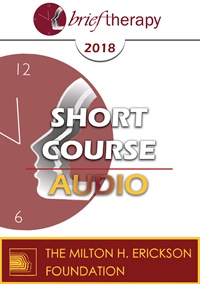
- Average Rating:
- Not yet rated
- Topic Areas:
- Short Courses | Dreamwork | Psychotherapy | Brief Therapy | Consciousness
- Categories:
- Brief Therapy Conference | Brief Therapy Conference 2018
- Faculty:
- Bruce Fordham, MA/CMHC
- Duration:
- 1:25:38
- Format:
- Audio Only
- Original Program Date:
- Dec 06, 2018
- Short Description:
- This workshop will provide a basic understanding of how to utilize dreamwork in psychotherapy, thereby providing an excellent alternative for patient care - especially when a patient's defenses are strong.
- Price:
- $15.00 - Base Price
- Average Rating:
- Not yet rated
- Topic Areas:
- Keynotes | Consciousness | Psychotherapy | Social Issues
- Categories:
- Evolution of Psychotherapy | Evolution of Psychotherapy 2005
- Faculty:
- Mary Catherine Bateson, PhD
- Course Levels:
- Master Degree or Higher in Health-Related Field
- Duration:
- 1:14:10
- Format:
- Audio and Video
- Original Program Date:
- Dec 08, 2005
- Short Description:
- An exploration of how psychotherapy can support people as they adapt to rapid cultural, social, and environmental change. Drawing on anthropology, developmental theory, and lived experience, the session invites participants to rethink distress not only as individual pathology, but as a response to shifting roles, values, and life stages. The talk challenges therapists to see their work as supporting lifelong growth, reflection, and meaning-making, especially as clients navigate aging, identity, and responsibility in an increasingly complex world.
- Price:
-
Sale is $29.00
price reduced from Base Price - $59.00
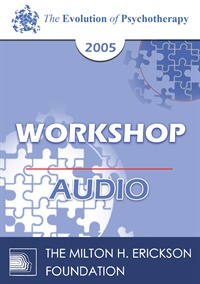
EP05 Workshop 23 - The Creative Reconstruction of Mind, Memory and Consciousness - Ernest Rossi, PhD
- Average Rating:
- Not yet rated
- Topic Areas:
- Workshops | Consciousness | Memory | Four-Stage Creative Process | Genomics | Hypnosis | Neuroscience | Psychotherapy
- Categories:
- Evolution of Psychotherapy | Evolution of Psychotherapy 2005
- Faculty:
- Ernest Rossi, PhD
- Duration:
- 2 Hours 36 Minutes
- Format:
- Audio Only
- Original Program Date:
- Dec 08, 2005
- Short Description:
- Lecture, group and individual demonstrations with volunteers from the audience will illustrate Rossi's activity-dependent approaches to therapeutic hypnosis and psychotherapy that are consistent with the theory and research on the molecular-genomic level plasticity for the creative reconstruction of mind, memory and consciousness.
- Price:
- $15.00 - Base Price
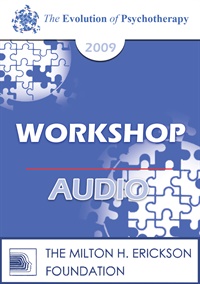
- Average Rating:
- Not yet rated
- Topic Areas:
- Consciousness | Psychotherapy | Workshops | Generative Psychotherapy
- Categories:
- Evolution of Psychotherapy | Evolution of Psychotherapy 2009
- Faculty:
- Stephen Gilligan, PhD
- Duration:
- 2 Hours 47 Minutes
- Format:
- Audio Only
- Original Program Date:
- Dec 12, 2009
- Short Description:
- The Generational Self approach emphasizes how the state of consciousness in which an experiential challenge is held determines whether a problem or solution develops. The model identifies three types of mind – Somatic, Cognitive, and Field,and how each mind can be operating at a Primitive, Ego, or Generative level. We will see how a problem degrades a person’s consciousness level so that change is impossible, and how that low-level state can be improved to a Generative level, so that the problematic experience either spontaneously changes, or is more easily engaged. Numerous practical techniques and clinical examples will be offered.
- Price:
- $15.00 - Base Price
- Average Rating:
- Not yet rated
- Topic Areas:
- Clinical Demonstrations | Consciousness | Psychotherapy
- Categories:
- Evolution of Psychotherapy | Evolution of Psychotherapy 2013
- Faculty:
- Daniel Siegel, MD
- Course Levels:
- Master Degree or Higher in Health-Related Field
- Duration:
- 1:10:38
- Format:
- Audio and Video
- Original Program Date:
- Dec 13, 2013
- Short Description:
- Educational Objectives: Describe the two aspects of consciousness that can be differentiated and then linked. Identify four aspects of consciousness represented on the “rim” in the Wheel of Awareness practice.
- Price:
-
Sale is $29.00
price reduced from Base Price - $59.00
Tags: Consciousness Psychotherapy
- Average Rating:
- Not yet rated
- Topic Areas:
- Keynotes | Psychotherapy | Consciousness | Neuroscience
- Categories:
- Evolution of Psychotherapy | Evolution of Psychotherapy 2013
- Faculty:
- Gerald Edelman, MD, PhD
- Course Levels:
- Master Degree or Higher in Health-Related Field
- Duration:
- 56:21
- Format:
- Audio and Video
- Original Program Date:
- Dec 11, 2013
- Short Description:
- Prevalent views of higher brain functions are based on the notions of computation and information processing. Various lines of evidence appear to be incompatible with this position and suggest instead that the brain operates according to a set of selectional principles. A theory addressing these principles, called Neural Darwinism, will be discussed. This theory has a direct bearing on our understanding of the neural basis of consciousness, a key issue in psychotherapy.
- Price:
-
Sale is $29.00
price reduced from Base Price - $59.00
- Average Rating:
- Not yet rated
- Topic Areas:
- Psychotherapy | Point/Counterpoint Sessions | Consciousness | Mind-Body | Psychology | Therapist Development
- Categories:
- Evolution of Psychotherapy | Evolution of Psychotherapy 2013
- Faculty:
- Ernest Rossi, PhD | Cloe Madanes, HDL, LIC | Richard Landis, PhD
- Course Levels:
- Master Degree or Higher in Health-Related Field
- Duration:
- 1:23:25
- Format:
- Audio and Video
- Original Program Date:
- Dec 12, 2013
- Short Description:
- Facilitating the RNA/DNA epigenetics of creating new consciousness is the next step in the evolution of psychotherapy. Restricting psychotherapy to the limitations of the cognitive-behavioral level is becoming a disservice to psychology. We must embrace the bioinformatics of the new technological devices that make it possible to assess and facilitate the dynamics of gene expression and brain plasticity economically within a single session of psychotherapy.
- Price:
-
Sale is $29.00
price reduced from Base Price - $59.00
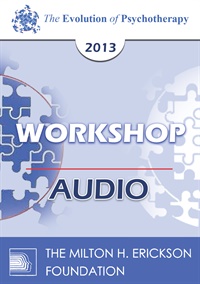
- Average Rating:
- Not yet rated
- Topic Areas:
- Workshops | Unconscious Processes | Art and Creativity | Consciousness | Four-Stage Creative Process | Psychotherapy
- Categories:
- Evolution of Psychotherapy | Evolution of Psychotherapy 2013
- Faculty:
- Ernest Rossi, PhD | Kathryn Rossi, PhD | Bruce Gregory, PhD | Birgitta Gregory, PhD
- Duration:
- 2 Hours 32 Minutes
- Format:
- Audio Only
- Original Program Date:
- Dec 11, 2013
- Short Description:
- What is Life? What is Consciousness? Theory, research and practice of Psychosocial Genomics are outlined as the next step in the Evolution of Psychotherapy. A live group demonstration of how to facilitate gene expression and brain plasticity by optimizing the 4-stage creative process for 20 minutes will be experienced by everyone.
- Price:
- $15.00 - Base Price
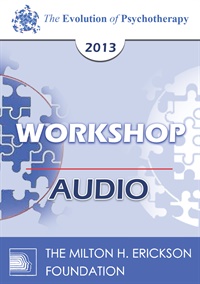
- Average Rating:
- Not yet rated
- Topic Areas:
- Consciousness | Psychotherapy | Workshops | Four-Stage Creative Process | Neuroscience | Hypnosis | Research
- Categories:
- Evolution of Psychotherapy | Evolution of Psychotherapy 2013
- Faculty:
- Ernest Rossi, PhD | Kathryn Rossi, PhD | Giovanna Celia, PhD | David Atkinson, MD
- Duration:
- 2 Hours 29 Minutes
- Format:
- Audio Only
- Original Program Date:
- Dec 12, 2013
- Short Description:
- This session ranges widely across psychotherapy, neuroscience, hypnosis, and clinical experience, inviting participants to think differently about how change actually happens. Moving between research, theory, and extended demonstrations, it explores brain plasticity, gene expression, creativity, and the role of altered states in therapeutic transformation. Along the way, the work challenges traditional models of hypnosis and emphasizes self-directed change, inner resources, and the subtle ways consciousness reshapes mind and body over time.
- Price:
- $15.00 - Base Price
Credit available - Click Here for more information
- Average Rating:
- Not yet rated
- Topic Areas:
- Speeches | Meditation, Spirituality and Yoga | Memory | Psychotherapy | Consciousness
- Categories:
- Evolution of Psychotherapy | Evolution of Psychotherapy 2017 | Online Continuing Education
- Faculty:
- Jean Houston, PhD
- Course Levels:
- Master Degree or Higher in Health-Related Field
- Duration:
- 1:00:39
- Format:
- Audio and Video
- Original Program Date:
- Dec 15, 2017
- Short Description:
- The discovery of the quantum nature of our universe is so major an event that its profound implications cannot be overstated. Quantum theory demands a radical re-visioning of the role of Consciousness as the underlying organizing principle of the universe. Working with these concepts, both spiritual and scientific, we have enabled students to be, to do and to create in ways that are suggestive of higher levels of human accomplishment. Similarly from the quantum perspective of the simultaneity of past, present and future we are able to change the story of minor past events until it become a realistic part of one’s memory.
- Price:
-
Sale is $29.00
price reduced from Base Price - $59.00
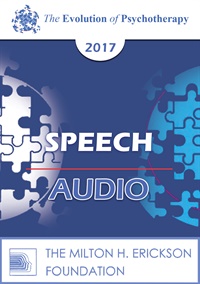
- Average Rating:
- Not yet rated
- Topic Areas:
- Speeches | Psychotherapy | Art and Creativity | Consciousness
- Bundle(s):
- Learning Track - EP17 Erickson Download
- Categories:
- Evolution of Psychotherapy | Evolution of Psychotherapy 2017 | Evolution of Psychotherapy Erickson Learning Track
- Faculty:
- Ernest Rossi, PhD | Kathryn Rossi, PhD
- Duration:
- 1:00:52
- Format:
- Audio Only
- Original Program Date:
- Dec 16, 2017
- Short Description:
- An Introduction to the facts and fallacies of how the Quantum World View could facilitate the Evolution of Psychotherapy by integrating the best insights of the arts, humanities and sciences to support people, cultures and nations to become the best they can be.
- Price:
- $15.00 - Base Price
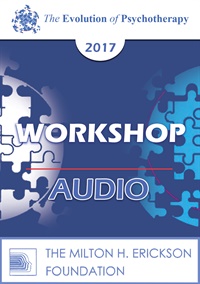
- Average Rating:
- Not yet rated
- Topic Areas:
- Workshops | Consciousness | Binds | Art and Creativity | Ericksonian Hypnosis and Therapy Techniques | Psychotherapy
- Bundle(s):
- Learning Track - EP17 Erickson Download
- Categories:
- Evolution of Psychotherapy | Evolution of Psychotherapy 2017 | Evolution of Psychotherapy Erickson Learning Track
- Faculty:
- Ernest Rossi, PhD | Kathryn Rossi, PhD
- Duration:
- 2:38:21
- Format:
- Audio Only
- Original Program Date:
- Dec 13, 2017
- Short Description:
- MHE's 1965 paper "A Special Inquiry with Aldous Huxley into the Nature and Character of Various States of Consciousness" will be used so everyone can experience their personal version of Deep Reflection, the Double Dissociation Double Bind and the Quantum Qualia of their private consciousness and cognition for facilitating gene expression and brain plasticity to optimize their own growing edges.
- Price:
- $15.00 - Base Price
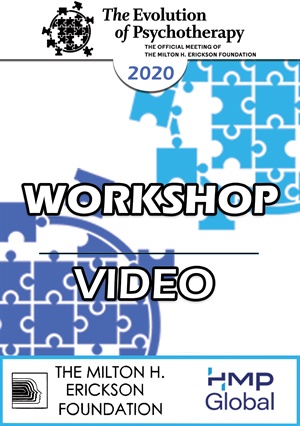
- Average Rating:
- Not yet rated
- Topic Areas:
- Neurobiology | Workshops | Consciousness | Psychotherapy
- Bundle(s):
- EP20 Highlights
- Categories:
- Evolution of Psychotherapy | Evolution of Psychotherapy 2020
- Faculty:
- Daniel Siegel, MD
- Course Levels:
- Master Degree or Higher in Health-Related Field
- Duration:
- 2 hours
- Format:
- Audio and Video
- Original Program Date:
- Dec 10, 2020
- Short Description:
- This workshop will explore the findings from a 10,000-person survey of a mind-training practice, the Wheel of Awareness, and how they can inform an understanding of the mind, mental health, and the transformative power of harnessing consciousness in psychotherapy. Workshop participants are encouraged to practice the Wheel of Awareness before the event so that their own direct experience can be compared and contrasted to the findings of the survey and then applied to their own practice of psychotherapy.
- Price:
-
Sale is $29.00
price reduced from Base Price - $59.00
Tags: EP20 Highlight
- Average Rating:
- Not yet rated
- Topic Areas:
- Keynotes | Therapist Development | Consciousness | Identity | Attachment
- Categories:
- Evolution of Psychotherapy | Evolution of Psychotherapy 2021
- Faculty:
- Diane Ackerman, MFA, PhD
- Course Levels:
- Master Degree or Higher in Health-Related Field
- Duration:
- 1 hour
- Format:
- Audio and Video
- Original Program Date:
- Dec 05, 2021
- Short Description:
- This keynote is a sweeping, poetic tour of what makes a self, blending neuroscience, evolution, memory, relationships and metaphor into a vivid portrait of human identity. Diane Ackerman explores how the brain constructs experience, how relationships shape our inner life, and how memory, emotion and imagination continually revise who we are. Participants are invited into a playful, profound meditation on consciousness, connection and the ever-changing mosaic of selves we carry through the world.
- Price:
- $59.00 - Base Price
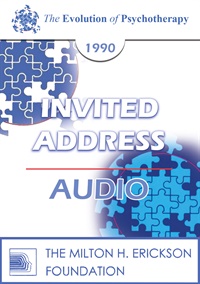
- Average Rating:
- Not yet rated
- Topic Areas:
- Invited Addresses | Consciousness | Psychotherapy | Relationships
- Categories:
- Evolution of Psychotherapy | Evolution of Psychotherapy 1990
- Faculty:
- James Hillman, PhD | Alexander Lowen, MD
- Duration:
- 1 Hour 30 Minutes
- Format:
- Audio Only
- Original Program Date:
- Dec 15, 1990
- Short Description:
- Psyche has been located wholly intrapersonally (within the individual} or interpersonally (between persons, families, groups}, but never is it conceived also extra-personally as a component of the world, as a world soul or anima mundi in the classical sense.
- Price:
- $15.00 - Base Price


